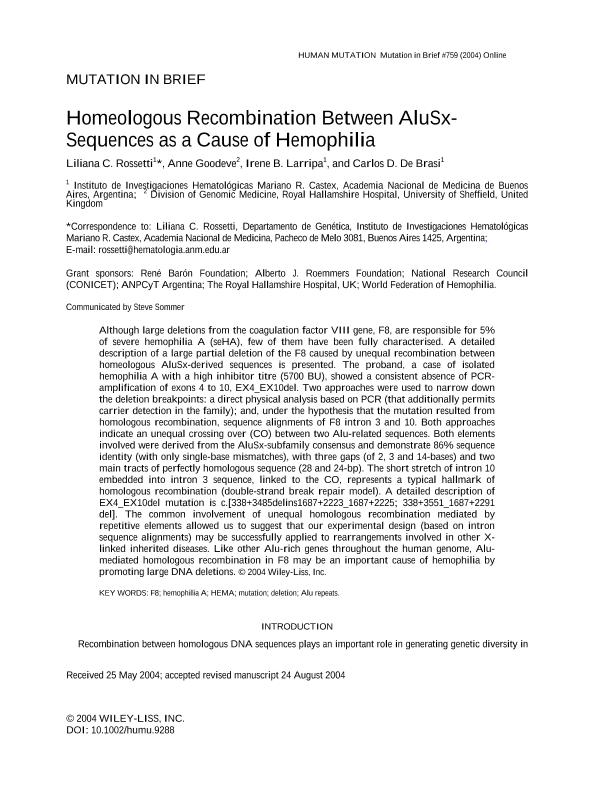Mostrar el registro sencillo del ítem
dc.contributor.author
Rossetti, Liliana Carmen

dc.contributor.author
Goodeve, Anne
dc.contributor.author
Larripa, Irene Beatriz

dc.contributor.author
de Brasi, Carlos Daniel

dc.date.available
2018-10-17T17:47:31Z
dc.date.issued
2004-12
dc.identifier.citation
Rossetti, Liliana Carmen; Goodeve, Anne; Larripa, Irene Beatriz; de Brasi, Carlos Daniel; Homeologous recombination between AluSx-sequences as a cause of hemophilia.; Wiley-liss, Div John Wiley & Sons Inc; Human mutation; 24; 5; 12-2004; 440-450
dc.identifier.issn
1098-1004
dc.identifier.uri
http://hdl.handle.net/11336/62582
dc.description.abstract
Although large deletions from the coagulation factor VIII gene, F8, are responsible for 5% of severe hemophilia A (seHA), few of them have been fully characterised. A detailed description of a large partial deletion of the F8 caused by unequal recombination between homeologous AluSx-derived sequences is presented. The proband, a case of isolated hemophilia A with a high inhibitor titre (5700 BU), showed a consistent absence of PCR-amplification of exons 4 to 10, EX4_EX10del. Two approaches were used to narrow down the deletion breakpoints: a direct physical analysis based on PCR (that additionally permits carrier detection in the family); and, under the hypothesis that the mutation resulted from homologous recombination, sequence alignments of F8 intron 3 and 10. Both approaches indicate an unequal crossing over (CO) between two Alu-related sequences. Both elements involved were derived from the AluSx-subfamily consensus and demonstrate 86% sequence identity (with only single-base mismatches), with three gaps (of 2, 3 and 14-bases) and two main tracts of perfectly homologous sequence (28 and 24-bp). The short stretch of intron 10 embedded into intron 3 sequence, linked to the CO, represents a typical hallmark of homologous recombination (double-strand break repair model). A detailed description of EX4_EX10del mutation is c.[338+3485delins1687+2223_1687+2225; 338+3551_1687+2291 del]. The common involvement of unequal homologous recombination mediated by repetitive elements allowed us to suggest that our experimental design (based on intron sequence alignments) may be successfully applied to rearrangements involved in other X-linked inherited diseases. Like other Alu-rich genes throughout the human genome, Alu-mediated homologous recombination in F8 may be an important cause of hemophilia by promoting large DNA deletions. Copyright 2004 Wiley-Liss, Inc.
dc.format
application/pdf
dc.language.iso
eng
dc.publisher
Wiley-liss, Div John Wiley & Sons Inc

dc.rights
info:eu-repo/semantics/openAccess
dc.rights.uri
https://creativecommons.org/licenses/by-nc-sa/2.5/ar/
dc.subject.classification
Genética Humana

dc.subject.classification
Medicina Básica

dc.subject.classification
CIENCIAS MÉDICAS Y DE LA SALUD

dc.title
Homeologous recombination between AluSx-sequences as a cause of hemophilia.
dc.type
info:eu-repo/semantics/article
dc.type
info:ar-repo/semantics/artículo
dc.type
info:eu-repo/semantics/publishedVersion
dc.date.updated
2018-10-12T17:27:07Z
dc.identifier.eissn
1059-7794
dc.journal.volume
24
dc.journal.number
5
dc.journal.pagination
440-450
dc.journal.pais
Estados Unidos

dc.journal.ciudad
New York
dc.description.fil
Fil: Rossetti, Liliana Carmen. Consejo Nacional de Investigaciones Científicas y Técnicas; Argentina. Academia Nacional de Medicina de Buenos Aires. Instituto de Investigaciones Hematológicas "Mariano R. Castex"; Argentina
dc.description.fil
Fil: Goodeve, Anne. University of Sheffield; Reino Unido
dc.description.fil
Fil: Larripa, Irene Beatriz. Consejo Nacional de Investigaciones Científicas y Técnicas; Argentina. Academia Nacional de Medicina de Buenos Aires. Instituto de Investigaciones Hematológicas "Mariano R. Castex"; Argentina
dc.description.fil
Fil: de Brasi, Carlos Daniel. Consejo Nacional de Investigaciones Científicas y Técnicas; Argentina. Academia Nacional de Medicina de Buenos Aires. Instituto de Investigaciones Hematológicas "Mariano R. Castex"; Argentina
dc.journal.title
Human mutation

dc.relation.alternativeid
info:eu-repo/semantics/altIdentifier/doi/https://dx.doi.org/10.1002/humu.9288
dc.relation.alternativeid
info:eu-repo/semantics/altIdentifier/url/https://onlinelibrary.wiley.com/doi/abs/10.1002/humu.9288
Archivos asociados
